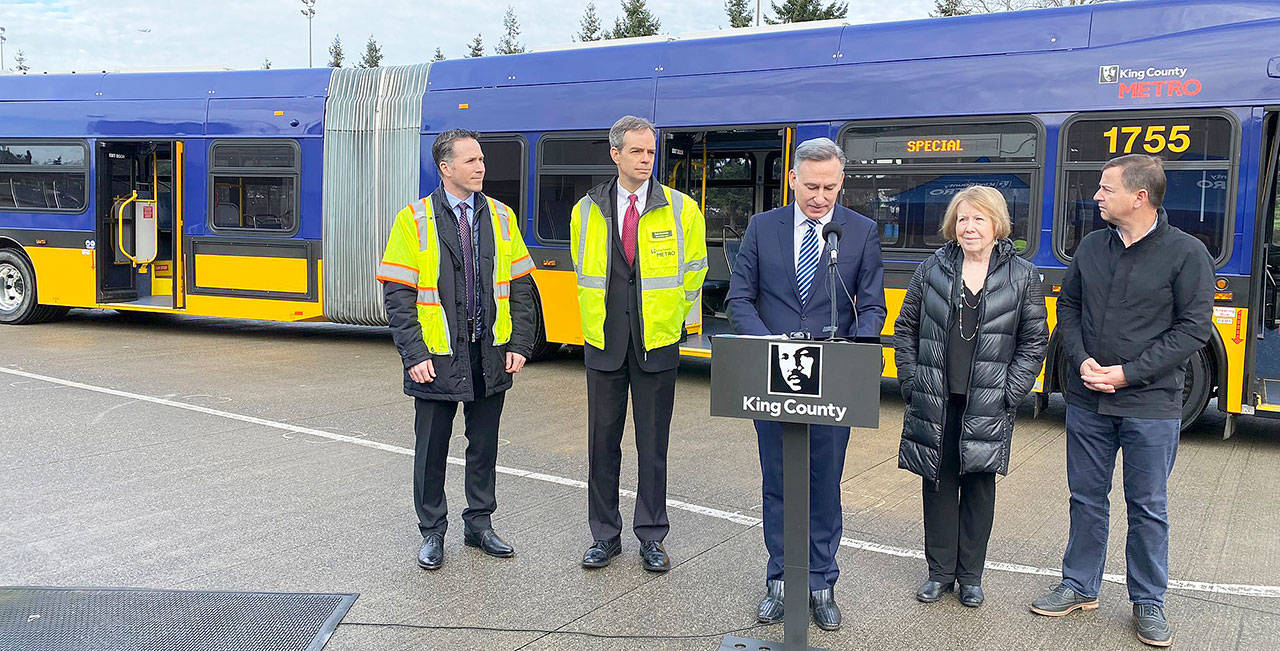King County Metro has agreed to purchase 40 battery-electric buses from New Flyer, Inc., to be delivered in 2021 and plans to order 80 more in the coming year – a major milestone in the county’s efforts to improve air quality, reduce carbon and create a zero-emissions bus fleet by 2040.
King County Executive Dow Constantine announced the deal Thursday.
The order is comprised of 40 60-foot-long articulated buses valued at $1.3 million each for a total of approximately $50 million, according to a news release from Constantine. The remaining 80 battery-electric buses planned for purchase include 20 more articulated buses and 60 40-foot-long buses, valued at approximately $925,000 each. Total cost for the second order, arriving in fall 2022, is estimated to be around $80 million.
In 2017, Constantine and Metro General Manager Rob Gannon called on the industry to invest more in battery-electric options, including the creation of coaches that could travel farther and handle the varying terrain requirements of the region.
New Flyer, based in Winnipeg, Manitoba, Canada with four manufacturing plants in the U.S., stepped up to the challenge, producing both a 40-foot and 60-foot battery-electric bus that met Metro’s specifications and timeline needs. These long-range battery-electric buses can travel approximately 140 miles on a single charge. The 11 existing short-range battery-electric buses in Metro’s fleet are 40 feet long and can travel 23 miles before requiring a 10-minute charge.
“Today, we’re celebrating major progress toward our goal of transforming Metro to a zero-emission bus fleet, which is better not only for the environment but also for our customers,” Constantine said in the news release. “These new buses will be able to serve routes all over King County, and especially in the southern part of the county, an area disproportionately affected by pollution. Working with New Flyer, we’ve procured 40 new buses that can handle anything we throw at them – quietly, efficiently, and fueled by clean power.”
Battery-electric buses have been operating in King County since 2016, when the county began testing and evaluating bus options for long-term service. The industry is changing rapidly, and Metro had initially pursued a different manufacturer for the purchase of 73 buses in 2017, however that manufacturer does not currently have a 60-foot-long option. New Flyer was able to meet Metro’s fleet needs, warranting a pivot in the original planned purchase. Metro continues to test coaches from several manufacturers.
“This first fleet order of battery-electric buses helps combat the climate crisis and enhances our ability to serve our customers,” Gannon said. “Hundreds of thousands of King County residents choose safe and efficient transit each weekday—keeping their cars off the road and emissions out of the air. This new battery-electric bus partnership with New Flyer allows us to do even more to reduce our county’s carbon footprint.”
Metro has received a total of $20 million in grant funding to support the acquisition of these battery-electric buses. This secured funding consists of $9.1 million from the Federal Transit Administration, partly from the Low-or-No Emission Vehicle Deployment Program, and $10.9 million from the Washington State Department of Ecology Volkswagen Settlement program. An additional $3.3 million in grant funding from the new Washington State Department of Transportation’s Green Transportation Capital Program has been recommended and is currently pending a decision by the state Legislature.
Coach details
The 120 coaches are New Flyer’s Xcelsior CHARGE model. The 60-foot-long coach has a capacity of up to 120 passengers including driver and the 40-foot-long coach can hold up to 76 including driver. Both bus models (40-foot-long and articulated 60-foot-long) have a battery size of 466 kWh.
“Metro is a proven climate leader in America, and today’s announcement brings us even closer to the reality of a 100% zero-emission fleet by 2040,” said Chris Stoddart, president, New Flyer of America. “For over 40 years we’ve proudly supported Metro with over 1,800 buses in pursuit of sustainable mobility, and together, this next step drives a major milestone that not only reduces Metro’s carbon footprint in King County, but improves air quality and helps to build a more livable community for everyone.”
Charging infrastructure
The next milestone in Metro’s journey to a zero-emission fleet is the addition of base capacity and charging infrastructure to support battery-electric bus fleet operations. A phased approach is planned, starting with the completion of a temporary interim bus base in fall 2020 next to the existing South Base, adding capacity for approximately 125 buses. This extra capacity will support Metro’s existing diesel/hybrid fleet until the first order of new battery-electric buses arrives one year later. This interim base will house a charging system for 100 buses installed in phases starting in 2021, which will be capable of charging the 120 buses housed at that facility. Metro is investing $41 million into this hybrid base construction, with electrification infrastructure estimated to cost $50-$60 million.
After this initial procurement of 120 buses, Metro plans an additional procurement of 250 battery electric buses for delivery in 2025, by which time Metro plans to complete its South Annex Base on land currently occupied by Metro’s Training Center and Construction Management Office. This base will house 250 battery-electric buses and be built with battery-electric bus conversion at the forefront.
Transportation is the region’s largest source of greenhouse gas emissions, emitting nearly half of all greenhouse gas emissions. Metro operates a fleet of 174 clean electric trolleys in Seattle and also takes an estimated 190,000 cars off the road each weekday across the county through robust bus service.
Talk to us
Please share your story tips by emailing editor@kentreporter.com.
To share your opinion for publication, submit a letter through our website https://www.kentreporter.com/submit-letter/. Include your name, address and daytime phone number. (We’ll only publish your name and hometown.) Please keep letters to 300 words or less.

